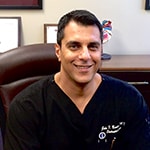What is Hypertrophic Obstructive Cardiomyopathy?
Hypertrophic obstructive cardiomyopathy (HOCM) results in the thickening of the myocardium, or heart tissue. This most commonly occurs in the interventricular septum and results in the left ventricle becoming smaller, preventing it from filling with blood. This can result in higher blood pressure and damage to the heart muscle, disrupting the heart’s electrical signals. Left untreated, this can lead to heart failure, arrhythmias, and even sudden cardiac death.
What Causes Hypertrophic Obstructive Cardiomyopathy?
In about 60% of all cases, HOCM is caused by a genetic disorder that is inherited. The remaining cases are the result of a spontaneous mutation in the myocardial cells. In those with HOCM, the myocardial cells continue to thicken, and the myocytes are unable to align properly. The myocytes are then replaced with fibrous tissue, leading to the thickening and shrinking of the ventricle.
What are the Symptoms of Hypertrophic Obstructive Cardiomyopathy?
Many of those with HOCM do not experience symptoms, and their disease may go undiagnosed for years. Symptoms can be mild, allowing those affected to lead normal, healthy lives. However, for some with HOCM, symptoms may be more noticeable and include:
- Shortness of breath
- Chest pain
- Fainting (syncope)
- A rapid heart rate
- Heart fluttering (heart murmur)
These symptoms are often triggered or worsened by physical activity.
Have Inquiries About Our Services?
How is Hypertrophic Obstructive Cardiomyopathy Treated?
To determine the right course of treatment for HOCM, Dr. Beshai will perform an electrocardiography (ECG) test to visualize the electrical signals and their strength. Because symptoms of HOCM are often triggered by physical activity, Dr. Beshai may also suggest a stress test to monitor how the heart responds to work. Once the HOCM murmur is detected, Dr. Beshai will suggest the proper form of treatment.
Some cases of HOCM can be treated with medication to lower the heart rate, allowing time for the ventricle to fill more effectively. In other cases, an implantable cardioverter defibrillator (ICD) can be used to regulate the heart’s electrical circuit and prevent heart failure.
Scheduling Your Hypertrophic Obstructive Cardiomyopathy Treatment Appointment
Dr. Beshai offers treatment for hypertrophic obstructive cardiopathy to prevent cardiac complications like heart failure. If you experience symptoms of HOCM or believe you could be at risk and want to know more about your treatment options, please call our office at 480-634-4449 or fill out our online form and schedule your appointment at the Heart Rhythm Institute of Arizona.
The Heart Institute of Arizona has a wide array of services that come with our premium care. From in-office dianostics and treatable conditions, to hospital based procedures, we’ve got your heart covered.
Dr. Beshai is a board-certified electrophysiologist internationally renowned and respected for his expertise and research. Having published in major medical journals and travelled all over the world to present research, he is dedicated to providing innovative, state-of-the-art care to his patients.
- John F. Beshai, MDhttps://heartbeataz.com/author/heartbeata/
- John F. Beshai, MDhttps://heartbeataz.com/author/heartbeata/
- John F. Beshai, MDhttps://heartbeataz.com/author/heartbeata/
- John F. Beshai, MDhttps://heartbeataz.com/author/heartbeata/

